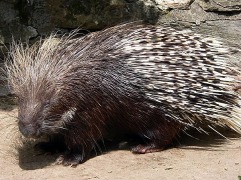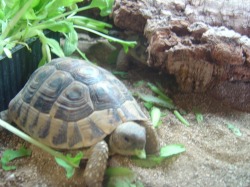The truth about the exotic pet trade
Monkeys, skunks, crocodiles, hedgehogs and porcupines. All animals you may expect to see on a wildlife programme – but in someone’s home? These are just some of the many different species traded in the UK as ‘exotic pets’.

More than 1,000 different species of exotic animals are kept by private keepers in the UK, outnumbering the range of traditional domesticated species such as cats and dogs and making exotic animals (those who are non-native and non-domesticated) the fastest growing sector in the UK pet market. One study found over 150 big cats (including 12 lions and 14 tigers), 500 monkeys and 250 poisonous snakes licensed to private keepers in the UK.
Many exotic animals are bought when they are young – and small! But before long they can become large and unmanageable. A rock python can grow up to 5 metres, an iguana to 1.5 metres and a terrapin over 30cm. A small tank soon becomes useless and sometimes even a whole room can’t provide the space these animals need. With parrots living for 80 years, snakes and monkeys for 30 and an iguana for 20 years, few people can provide the lifetime of responsible care that these animals need. Many exotic animals are passed from home to home, never receiving adequate care or a stable environment. In the wild, primates spend their entire lives in the company of others, something human owners cannot provide. Many primates in private homes don’t even have the company of another of their species.
Exotic animals do not make good pets and are not suited to life in captivity. Purchasing an exotic animal also means supporting a trade that involves a high level of cruelty and environmental destruction - as many animals in the trade are captured from the wild. There is no easy way of telling whether exotic animals have been bred in captivity or are wild-caught.
Welfare concerns:
Promoters of exotic pets often claim they are simple to care for, with reptiles described as “perfect for people with busy lives as you don't need to take them for a walk or need a lot of space for them to live in". However, every species is highly adapted for its own unique environment and occupies a specialised place in the ecosystem and a human home cannot provide for all of the animals’ needs.
Many of the animals sold in the pet trade are normally social species, yet are kept individually. Sugar gliders, a small marsupial, are very social and, if they are not given enough attention, may self-mutilate or die from the stress of loneliness.
Reptiles can suffer respiratory diseases, fungal infections, rickets, and mouth-rot from incorrect humidity and insufficient light. Many are burned because of the misuse of lamps and other heat sources. Even basic provisions can be life-threatening: the wrong litter used in enclosures can be fatal if ingested. Malnutrition has been found in up to 15% of pet reptiles and most reptile and bird cases seen by vets are associated with poor husbandry. Few vets have the specialist knowledge to either treat exotic animals of to advise owners on their care. Many refuse to treat primates because of the disease risks and entire skunks. Those vets that do specialise are few and far between - and their time is very expensive. With reptiles being sold as cheap pets to keep, how likely is it that people can afford, or want to pay for, specialist treatment?
Many exotic animals are bought when they are young – and small! But before long they can become large and unmanageable. A rock python can grow up to 5 metres, an iguana to 1.5 metres and a terrapin over 30cm. A small tank soon becomes useless and sometimes even a whole room can’t provide the space these animals need. With parrots living for 80 years, snakes and monkeys for 30 and an iguana for 20 years, few people can provide the lifetime of responsible care that these animals need. Many exotic animals are passed from home to home, never receiving adequate care or a stable environment. In the wild, primates spend their entire lives in the company of others, something human owners cannot provide. Many primates in private homes don’t even have the company of another of their species.
Exotic animals do not make good pets and are not suited to life in captivity. Purchasing an exotic animal also means supporting a trade that involves a high level of cruelty and environmental destruction - as many animals in the trade are captured from the wild. There is no easy way of telling whether exotic animals have been bred in captivity or are wild-caught.
Welfare concerns:
Promoters of exotic pets often claim they are simple to care for, with reptiles described as “perfect for people with busy lives as you don't need to take them for a walk or need a lot of space for them to live in". However, every species is highly adapted for its own unique environment and occupies a specialised place in the ecosystem and a human home cannot provide for all of the animals’ needs.
Many of the animals sold in the pet trade are normally social species, yet are kept individually. Sugar gliders, a small marsupial, are very social and, if they are not given enough attention, may self-mutilate or die from the stress of loneliness.
Reptiles can suffer respiratory diseases, fungal infections, rickets, and mouth-rot from incorrect humidity and insufficient light. Many are burned because of the misuse of lamps and other heat sources. Even basic provisions can be life-threatening: the wrong litter used in enclosures can be fatal if ingested. Malnutrition has been found in up to 15% of pet reptiles and most reptile and bird cases seen by vets are associated with poor husbandry. Few vets have the specialist knowledge to either treat exotic animals of to advise owners on their care. Many refuse to treat primates because of the disease risks and entire skunks. Those vets that do specialise are few and far between - and their time is very expensive. With reptiles being sold as cheap pets to keep, how likely is it that people can afford, or want to pay for, specialist treatment?
Many thanks to The Captive Animals' Protection Society for the above information which is taken from their 'Exotic Animals are Not Pets' factsheet. We highly recommend you visit http://www.captiveanimals.org/images/Exotic%20pet%20factsheet.pdf and read this factsheet in full in its original format. Please support CAPS and their invaluable work by visiting their website at http://www.captiveanimals.org and seeing how you can help.

